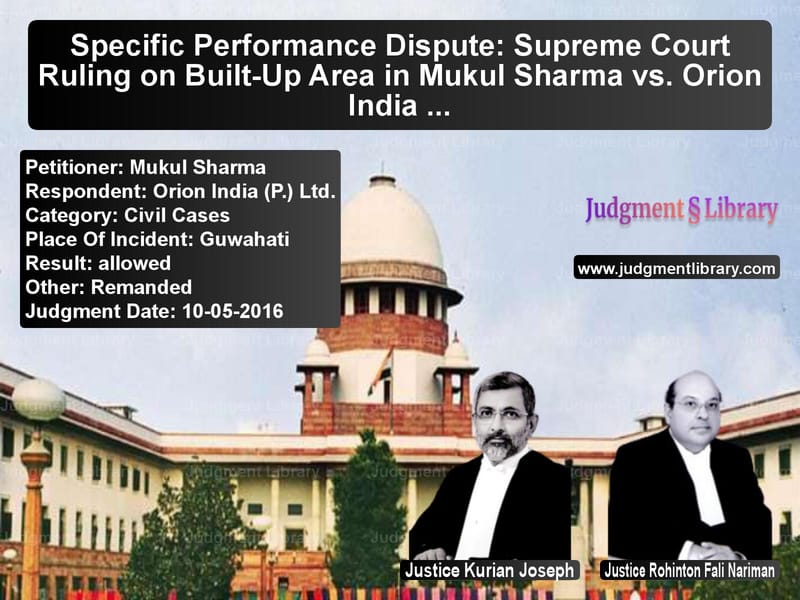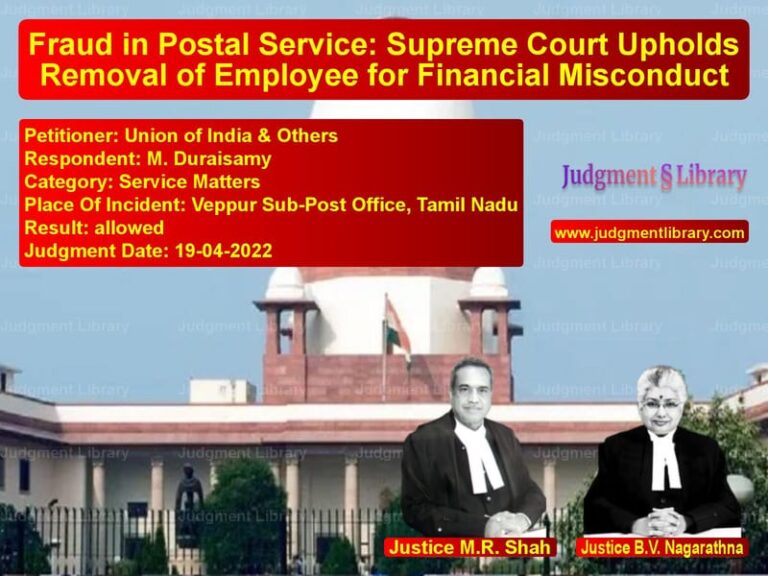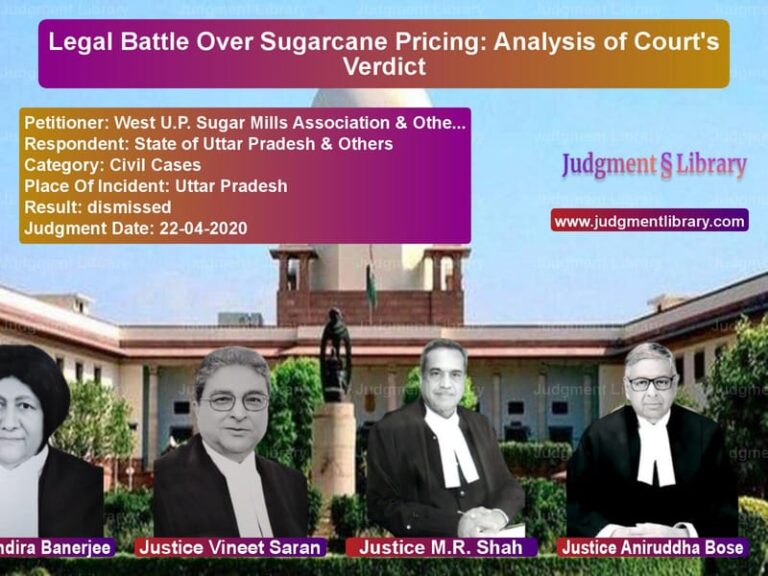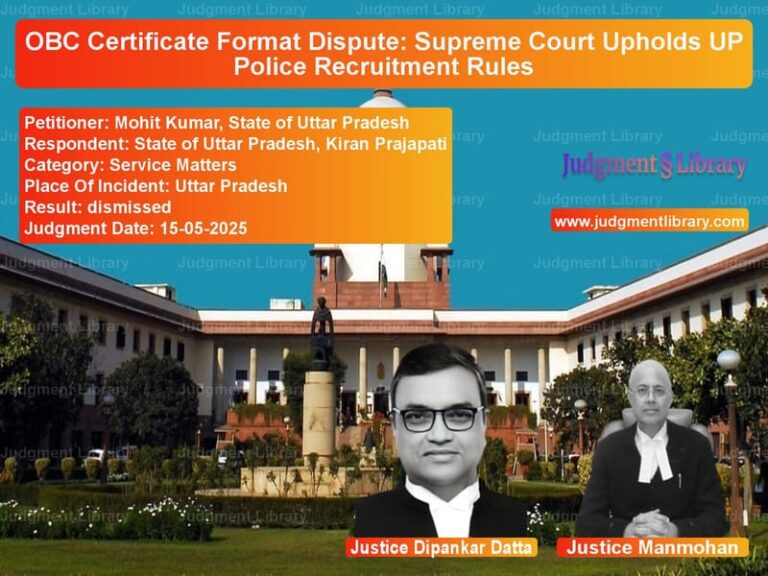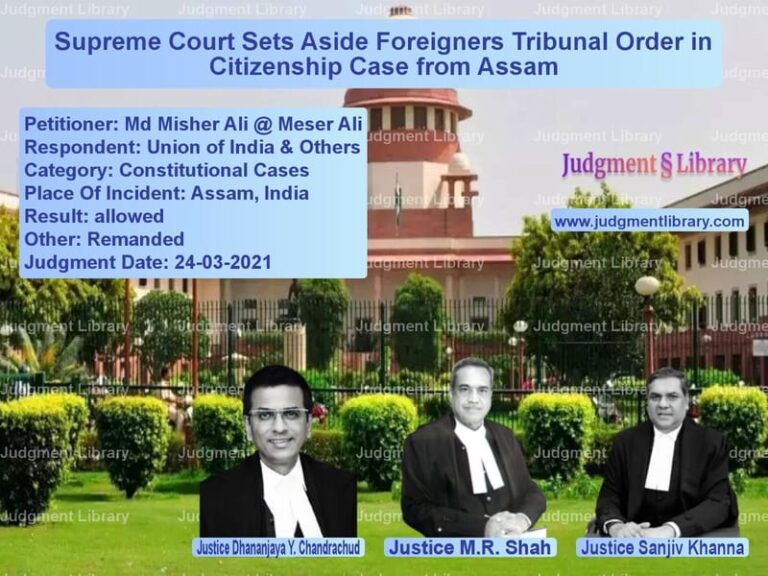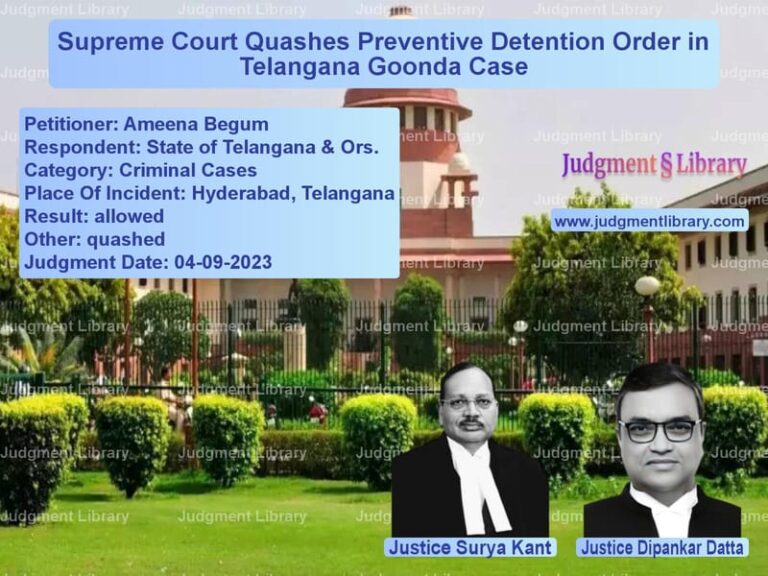Specific Performance Dispute: Supreme Court Ruling on Built-Up Area in Mukul Sharma vs. Orion India (P.) Ltd.
The Supreme Court of India recently ruled in the case of Mukul Sharma vs. Orion India (P.) Ltd., addressing a dispute regarding the interpretation of “built-up area” in a property agreement. This case highlights the importance of clarity in property contracts and the role of subsequent conduct in interpreting contractual terms.
Background of the Case
The case originated when Mukul Sharma, the appellant, filed Title Suit No. 195 of 1998 before the Civil Judge (Senior Division), Guwahati, seeking specific performance of an agreement dated August 25, 1992. The dispute revolved around the meaning of “built-up area” in the contract, which impacted the portion of the property Sharma was entitled to receive.
As per the agreement, the appellant was to receive:
- Half of the built-up area on the ground floor
- Half of the built-up area on the mezzanine floor
- The entire built-up area on the first floor
The core dispute was whether the “built-up area” included common areas such as corridors, lobbies, and lift wells.
Trial Court’s Decision
The trial court ruled in favor of Mukul Sharma, stating that “built-up area” excluded common areas. This decision was based on letters exchanged between the parties in March 1998, where the respondent, Orion India (P.) Ltd., had agreed to the appellant’s interpretation of “built-up area.”
High Court Appeal
Orion India (P.) Ltd. appealed against the trial court’s decision. The High Court framed the following key issues:
- Whether the agreement originally included common areas in the built-up area.
- Whether the plaintiff (Mukul Sharma) was entitled to specific performance.
- Whether the plaintiff was entitled to a monetary decree.
The High Court ruled in favor of Orion India (P.) Ltd., holding that “built-up area” included common areas. The court relied on a letter dated September 15, 1997, where the appellant had initially accepted that built-up area included common spaces.
Supreme Court’s Judgment
Mukul Sharma appealed to the Supreme Court, arguing that the High Court had ignored subsequent agreements between the parties.
The Supreme Court, comprising Justice Kurian Joseph and Justice Rohinton Fali Nariman, ruled in favor of the appellant, setting aside the High Court’s decision and restoring the trial court’s judgment.
Key Observations by the Supreme Court
- The agreement did not define “built-up area,” making interpretation necessary.
- Although the appellant initially accepted common areas as part of the built-up area in 1997, he later contested this interpretation.
- The respondent (Orion India) had, through letters dated March 9, 1998 and March 16, 1998, explicitly agreed to the appellant’s definition that built-up area excluded common areas.
Referring to these letters, the Court noted:
“The built-up area should be defined as ‘the area within the four walls excluding the common area such as lift well, lobby, corridor, etc.’”
The Court emphasized that contracts can evolve based on mutual agreements between parties and that the respondent had accepted the new definition. It stated:
“It is not a case where the plaintiff resiled from the agreement. It is a case where the defendant himself subsequently accepted the dispute raised by the plaintiff.”
Legal Principles Applied
The Court referred to the precedent in Abdulla Ahmed vs. Animendra Kissen Mitter (1950 AIR SC 15), which held:
“Extrinsic evidence to determine the effect of an instrument is permissible where there remains a doubt as to its true meaning. Evidence of the acts done under it is a guide to the intention of the parties.”
Similarly, in The Godhra Electricity Co. Ltd. vs. The State of Gujarat (1975 AIR SC 32), it was held:
“Evidence of the acts done under a contract is a guide to the intention of the parties, particularly when acts are done shortly after the date of the instrument.”
Based on these precedents, the Supreme Court ruled that the conduct of the parties post-agreement provided clarity and the respondent was bound by its later acceptance of the appellant’s interpretation.
Final Verdict
The Supreme Court:
- Allowed the appeal.
- Set aside the High Court’s ruling.
- Restored the trial court’s judgment, confirming that built-up area excluded common areas.
- Directed the trial court to calculate the built-up area to be handed over to the appellant accordingly.
Implications of the Judgment
This ruling has significant implications for property law and contract interpretation:
- Importance of Clarity in Contracts: Developers and buyers must ensure that key terms such as “built-up area” are well-defined to avoid future disputes.
- Significance of Subsequent Agreements: Even if a party initially interprets a contract in one way, later mutual agreements can alter the understanding.
- Role of Conduct in Contract Interpretation: The Court recognized the principle that post-contractual conduct can be used to clarify ambiguous terms.
Conclusion
The Supreme Court’s ruling in Mukul Sharma vs. Orion India (P.) Ltd. reaffirms the importance of mutual understanding in contract execution. While written agreements are binding, the Court acknowledged that parties can redefine terms through subsequent discussions. This case sets a precedent for property disputes, emphasizing the need for clear definitions and considering later mutual conduct in contract interpretation.
Don’t miss out on the full details! Download the complete judgment in PDF format below and gain valuable insights instantly!
Download Judgment: Mukul Sharma vs Orion India (P.) Ltd Supreme Court of India Judgment Dated 10-05-2016-1741860871084.pdf
Direct Downlaod Judgment: Direct downlaod this Judgment
See all petitions in Contract Disputes
See all petitions in Property Disputes
See all petitions in Judgment by Kurian Joseph
See all petitions in Judgment by Rohinton Fali Nariman
See all petitions in allowed
See all petitions in Remanded
See all petitions in supreme court of India judgments May 2016
See all petitions in 2016 judgments
See all posts in Civil Cases Category
See all allowed petitions in Civil Cases Category
See all Dismissed petitions in Civil Cases Category
See all partially allowed petitions in Civil Cases Category

